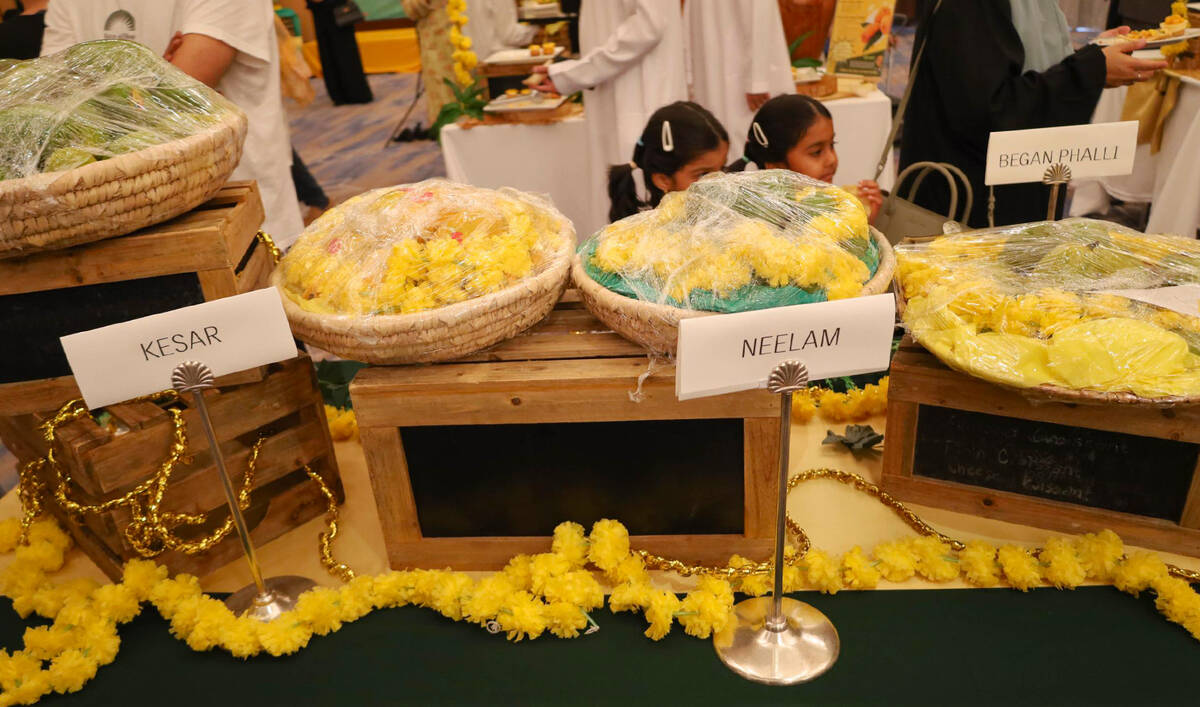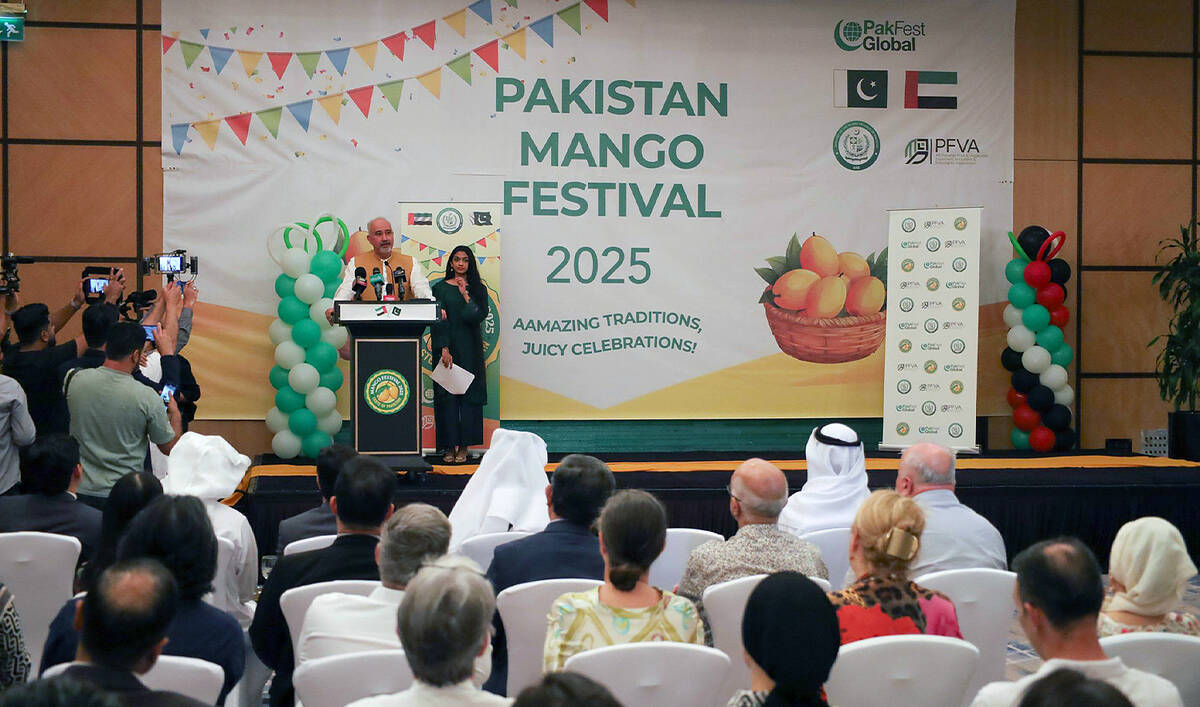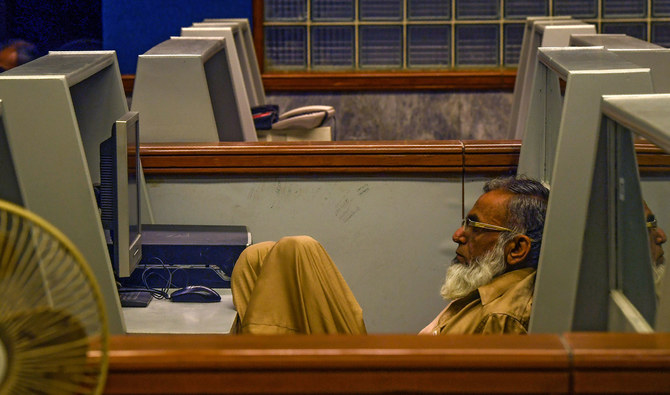KARACHI: Pakistan's stock market was down on Tuesday with oil and gas recording a major dip after international oil prices crashed to below zero.
Experts, however, are optimistic that the country could benefit from the historically low oil prices.
The Pakistan stock exchange’s benchmark KSE-100 index was down by more than 3 percent or 1,131 points by afternoon trade as investors weighed heavily on an unprecedented meltdown in the international oil market where oil prices crashed through zero, closing at -$37 per barrel.
“The market is in pressure today due to the international oil prices as the uncertainty about the oil futures prevails. Otherwise, the market was bullish," Abdul Azeem, Head of Research at Spectrum Securities, said.
He added that the impact of the "global oil prices' decline" is reflected in the oil and gas shares which are taking "a major hit today".
On Monday, the US trade of West Texas Intermediate (WTI) for May delivery fell more than 300% to $37.63 a barrel.
It marks the first time in history that crude oil has plunged to below zero, mainly due to disruptions caused by the coronavirus outbreak and a price war between Saudi Arabia and Russia.
“The prices for WTI reflect the contract for May, which expires this week. The crash reflects that the traders are leaving the May contract, and moving on to June. This is the theoretical value, and when the buying starts again, it will go up," Tahir Alam, General Secretary, Petroleum Club of Pakistan, said.
Experts say the turn of events could be good news for Pakistan by drastically reducing its oil import bill.
“The oil prices are declining due to a lack of demand and oversupply as more than 200 million barrels of oil are oversupplied. Lack of storage capacities, high-handling costs force producers to sell the oil at throw-away prices," Masood Siddiqui, former CEO of Pakistan’s energy giant Oil and Gas Development Company OGDC, told Arab News.
He added that the situation could turn Pakistan's current account into surplus and "render exports competitive after energy cost cuts”.
Pakistan’s petroleum products’ imports declined by 39.2 percent to $668 million in March 2020 when compared to those recorded last month, while the country imported $8.9 billion worth of oil which is 16 percent down during the July- March period of the current fiscal year FY20, according to the Federal Bureau of Statistics (FBS).
Siddiqui, who is also a veteran petroleum expert, predicts that the depressed oil price scenario will last for at least three years.
“The countries exporting oil would take a major hit... while those importing the commodity could benefit from the situation that is expected to stay at least for three years," Siddiqui said, adding that thousands of oil companies in the US "may go bankrupt" after failing "to pay back their investors and creditors.”
Commenting on the future of Pakistan’s exploration and production companies, the former OGDC head said that the price floor and ceiling mechanism in the Petroleum Exploration & Production Policy 2012 protects their interests in the South Asian country.
Pakistan's shares on Monday posted more than 2 percent gains as investors weighed the positive outcome of the central bank’s surprise rate cut by 2 percent on leveraged scrips, a decision by G20 creditors to defer $12 billion payments through a debt relief fund, and the IMF's approval for a $1.4 billion economic support during the coronavirus pandemic, and the stability of the rupee against the dollar.
Pakistan's stock market takes a beating after global oil price crash
https://arab.news/gjp5k
Pakistan's stock market takes a beating after global oil price crash

- Registers a 3% drop after commodity cost closes at -$37 a barrel
- Islamabad could benefit from low rates which are likely to last for three years, experts say
Pakistan plans naval, air collaboration in unmanned systems to boost indigenous capabilities

- The development comes weeks after a four-day Pakistan-India military standoff, which saw a widescale use of drones by them
- Small-scale drone attacks can strike targets without risking defense personnel or provoking uncontrollable military escalation
ISLAMABAD: Pakistan’s naval and air forces will be undertaking a strategic collaboration to advance indigenous capabilities in unmanned warfare systems, the country’s military said on Monday, citing Pakistan Navy Chief Admiral Naveed Ashraf.
The development comes weeks after a four-day military standoff between Pakistan and India, in which the two countries traded fighter jet, missile, drone and artillery fire, leaving 70 people dead on both sides before a United States-brokered ceasefire on May 10.
The fighting in May marked the first time New Delhi and Islamabad utilized unmanned aerial vehicles (UAVs) at scale against each other, with defense analysts expecting increased use of UAVs by them in future as small-scale drone attacks can strike targets without risking personnel or provoking uncontrollable escalation.
During a visit to Pakistan Air Force’s (PAF) Air War College Institute in Karachi, Naval Chief Ashraf announced the initiation of more frequent, integrated joint operational exercises with PAF, aimed at further reinforcing synergy and interoperability between the two services.
“The Naval Chief also highlighted the transformative role of technological innovation in contemporary conflicts. Citing the growing significance of Unmanned Aerial Systems, he highlighted an upcoming strategic collaboration between the National Aerospace Science & Technology Park (NASTP) and Pakistan Maritime Science & Technology Park (PMSTP),” the Inter-Services Public Relations (ISPR), the military’s media wing, said in a statement.
“This partnership, he noted, will focus on advancing indigenous capabilities in unmanned systems, thereby bolstering Pakistan’s technological self-reliance and operational edge in the defense sector.”
The development comes as the two South Asian neighbors, which spent more than $96 billion on defense last year, appear to be locked in a drones arms race.
India plans to invest heavily in local industry and could spend as much as $470 million on UAVs over the next 12 to 24 months, roughly three times pre-conflict levels, Smit Shah of Drone Federation India, which represents over 550 companies and regularly interacts with the government, told Reuters last month.
The PAF, meanwhile, is pushing to acquire more UAVs as it seeks to avoid risking its high-end aircraft, Reuters quoted a Pakistani source familiar with the matter as saying.
Pakistan and India both deployed cutting-edge 4.5 generation fighter jets during the latest clashes but cash-strapped Islamabad only has about 20 high-end Chinese-made J-10 fighters compared to the three dozen Rafales that Delhi can muster.
Pakistan is likely to build on existing relationships to intensify collaboration with China and Turkiye to advance domestic drone research and production capabilities.
Speaking to participants of an air war course in Karachi, Admiral Ashraf underscored that operational preparedness remains the cornerstone of triumph in modern warfare.
“He referenced recent developments along the eastern front as a vivid illustration of the critical need for constant readiness and strategic foresight,” the ISPR said.
“Emphasizing the imperative of cohesive national defense, he stressed the importance of inter-services collaboration in achieving strategic objectives.”
India and Pakistan, bitter rivals since they gained independence in 1947 from British rule, have fought three wars, including two over the disputed Himalayan territory of Kashmir.
The latest crisis was also triggered by an attack in Indian-administered Kashmir, which New Delhi blamed on Pakistan-backed militants without offering any evidence. Islamabad denied the allegation.
Pakistan to consider extending deadline for Afghan refugees facing mass deportation

- Any extension approved by the government would be a relief for those previously ordered to return to Afghanistan by June 30
- In 2023, Pakistan had launched a controversial crackdown on foreigners it said were in the country illegally, mostly Afghans
PESHAWAR: Pakistan will consider extending the deadline for 1.4 million Afghan refugees living legally in the country to return home, officials said on Monday.
Any extension approved by the government would be a relief for those who were previously ordered to return to Afghanistan by June 30, according to government and security officials. A decision could come on Tuesday when the Cabinet is due to meet.
In 2023, Pakistan launched a controversial crackdown on foreigners it said were in the country illegally, mostly Afghans. Millions of Afghans have fled their homeland over the decades to escape war or poverty.
The officials — who spoke on condition of anonymity because they were not authorized to talk to the media on the record — said the proposed extension was to allow the refugees more time to settle their personal affairs in Pakistan, such as selling property or wrapping up business activities, before returning to Afghanistan in an orderly and dignified way.
A senior ministry official said the decision to submit the extension proposal was made last week. A summary regarding the fate of the Afghan refugees has been forwarded for inclusion in the Cabinet agenda.
The Interior Ministry, which has overseen the sweeping crackdown on Afghans, did not immediately comment.
There was no comment from the Foreign Affairs Ministry, which previously said it expected Afghan authorities to create “conducive conditions” so those returning were fully integrated into Afghan society.
Earlier this year, Pakistan said it wanted 3 million Afghans to leave the country, including 1.4 million people with Proof of Registration cards and some 800,000 with Afghan Citizen Cards. There are a further 1 million Afghans in the country illegally because they have no paperwork, according to officials.
They said Pakistan’s Ministry of States and Frontier Regions submitted a proposal to the federal government recommending a six-month extension for Afghans with Proof of Registration cards.
Pakistan’s expulsion campaign has drawn strong criticism from the UN and rights organizations.
Human Rights Watch has accused authorities of arbitrarily detaining and forcibly deporting Afghans, many of whom, they say, face harassment under the Taliban who seized power in Afghanistan in 2021.
On Saturday, the UN refugee agency said at least 1.2 million Afghans have been forced to return from Iran and Pakistan this year. It warned that repatriations on a massive scale have the potential to destabilize the fragile situation in Afghanistan.
Pakistani mango festival in Abu Dhabi promotes exports, celebrates Gulf demand

- Pakistan is world’s fourth-largest mango producer, Gulf countries receive 75% exports
- Festival in Abu Dhabi aims to promote trade while also strengthening Pakistan-UAE ties
ISLAMABAD: Pakistan’s embassy in the United Arab Emirates held a mango festival in Abu Dhabi to promote the country’s prized fruit exports, as demand for Pakistani mangoes continues to surge across the Gulf region, the mission said in a statement on Monday.
The “Pakistani Mango Festival 2025,” hosted at the Le Royal Meridien Hotel in partnership with the Overseas Pakistani Foundation on Sunday, drew a large gathering of Emirati dignitaries, diplomats, business leaders, and members of the Pakistani expatriate community, the embassy said in a statement.

Pakistan is the world’s fourth-largest mango producer, according to the Trade Development Authority of Pakistan (TDAP), with an annual output of around 1.8 million tons. In 2023, the country exported over 125,000 tons of mangoes, generating nearly $100 million in revenue, official data shows.
Approximately 75% of Pakistan’s mango exports are shipped to the Gulf region.
“Festivals like the Mango Festival not only celebrate our agricultural excellence but also build bridges of understanding and friendship between the people of Pakistan and the UAE,” the statement said, quoting Pakistan’s Ambassador to the UAE, Faisal Niaz Tirmizi, as saying during the event.

Popular varieties such as Sindhri, Chaunsa, Anwar Ratol, and Langra were on display and served at the festival, offering guests a taste of Pakistan’s agricultural richness.
The UAE is home to more than 1.7 million Pakistanis, one of the largest overseas communities, and serves as a key market and transit point for Pakistani agricultural exports to the broader Middle East.
Mango season in Pakistan typically runs from May to September, with exports peaking between June and August.
India-Pakistan conflict hits shared love of film, music

- India and Pakistan banned artists, YouTube channels from each other’s countries after their militaries fought in May
- While Bollywood movies have always been popular in Pakistan, Indians love music, drama serials produced by Pakistan
LAHORE: While conflict raged between the powerful militaries of India and Pakistan, a battle was also fought on the cultural front lines despite years of shared love for films and music.
The deadly fighting in early May — the worst in decades — affected artists previously untouched by animosity between their leaders.
Ali Gul Pir, a Pakistani rapper and comedian with a huge Indian following, released a song years ago mocking Indian Prime Minister Narendra Modi.
While he was spared consequences then, in May, his YouTube channel and Instagram profile were blocked in India.
“Indians now recognize that the digital space serves as a bridge between Pakistanis and Indians, and they seem intent on severing that connection,” Pir told AFP.

The collapse in bilateral relations was caused by a deadly April attack on tourists in India-administered Kashmir, which New Delhi blamed on Islamabad.
Pakistan denied the allegation and, after tit-for-tat diplomatic retaliation, their militaries fought for four days before a ceasefire was reached.
The conflict hit the music industry for the first time, with Pakistani singer Annural Khalid also remembering how her Indian following dropped off.
“Delhi was my top listening city before the ban,” said Khalid, who has 3.1 million monthly listeners on Spotify.
“I suffered a great loss in the audience” from India, she told AFP.
“Listeners were deprived of content because music was turned into something it is not,” Khalid added.

The conflict also scrubbed out some prior exchanges, such as the soundtrack of the 2017 film “Raees” on Spotify in India.
It now shows only Indian actor Shah Rukh Khan, without his Pakistani co-star Mahira Khan.
With Pakistan producing just a handful of movies each year under strict censorship rules, Bollywood has always proven popular among viewers.
“I grew up watching Bollywood. We have the same traumas, we have the same history, we have the same stories,” said Pakistani film critic Sajeer Shaikh.

Pakistani actors and directors have for decades seen making it to Bollywood as the ultimate recognition.

But this month, Indian star Diljit Dosanjh announced his latest movie, “Sardaar Ji 3,” which features four Pakistani actors, would be released “overseas only,” after New Delhi banned Pakistani content and artists from productions.
“Abir Gulaal,” a love story starring Pakistan’s Fawad Khan and Indian actor Vaani Kapoor, was scheduled to hit Indian cinemas on May 9 but the release was postponed.
Even some in the industry who had previously backed the cross-border artistic trade changed their tune last month.
“Everything should be banned... cricket, films, everything,” said Indian actor Suniel Shetty, who has a big fan following in Pakistan.

He starred in the 2004 movie “Main Hoon Na,” which subtly promotes peace between India and Pakistan.
“It’s something really unfortunate about politics, creating that rift and putting boundaries around art,” said Dua Zahra, assistant manager at Warner Bros South Asia’s music label in Pakistan.
As part of its measures in the wake of the Kashmir attack, New Delhi’s ban on some Pakistani YouTube channels included private broadcaster HUM TV.
The channel, which says around 40 percent of its viewers are from India, simply told its fans to use a VPN to continue watching.
Since Modi took office more than a decade ago, many Indian critics and filmmakers have warned that Bollywood is now increasingly promoting his government’s Hindu nationalist ideology.
While the conflict has created divisions on the cultural scene, there are signs that the trade will endure.
Over a month after the ceasefire, three Indian films were in the top 10 on Netflix Pakistan, while the top 20 trending songs in India included two Pakistani tracks.
Pir, the rapper and comedian, vowed to “bridge gaps.”
“Let’s not make war, let’s just make art,” he said.
“Let’s just not bomb each other.”
Pakistan urges India to abide by Indus Waters Treaty after world court’s supplemental award

- The court ruled that India’s decision of suspending the treaty didn’t affect its competence to adjudicate Pakistan’s complaints
- The South Asian neighbors have been arguing over hydroelectric projects on the shared Indus river and tributaries for decades
ISLAMABAD: Pakistan on Monday urged India to restore the Indus Waters Treaty (IWT), which ensures water for 80 percent Pakistani farms, and fulfil its obligations, days after the Permanent Court of Arbitration (PCA) announced a supplemental award on the proceedings instituted by Pakistan against India over Indus waters.
India announced it was putting the 1960 World Bank-mediated treaty in abeyance a day after an attack in Indian-administered Kashmir that New Delhi blamed on Pakistan, an allegation Islamabad denies. Pakistan has previously said the treaty has no provision for one side to unilaterally pull back and that any blocking of river water flowing to Pakistan will be considered “an act of war.”
In its supplemental award on the proceedings instituted by Pakistan against India over two hydroelectric projects, the court ruled on June 27 that India’s decision of holding the IWT in abeyance did not deprive the court of its competence to adjudicate Pakistan’s complaints against its neighbor. Pakistan has opposed some of hydroelectric projects by India, saying they violate the World Bank-mediated treaty on the sharing of the Indus waters.
In response to the supplemental award announced by the Court of Arbitration, Pakistan’s Foreign Office said the court found hearing the Pakistan-India dispute over Kishenganga and Ratle hydroelectric projects found that it has a continuing responsibility to advance these proceedings in a timely, efficient and fair manner.
“The Court of Arbitration decided to announce this supplemental award in the wake of India’s illegal and unilateral announcement to hold the Indus Waters Treaty in abeyance,” the Pakistani Foreign Office said in a statement.
“The award vindicates Pakistan’s position that the Indus Waters Treaty remains valid and operational, and that India has no right to take a unilateral action about it. We urge India to immediately resume the normal functioning of the Indus Waters Treaty, and fulfil its treaty obligations, wholly and faithfully.”
Last week, the PCA said it had previously found that once a proceeding before a court of arbitration is properly initiated, as in the present case, “there must be a strong presumption against the incidental loss of jurisdiction over the matters placed before it by subsequent acts, such as the appointment of a neutral expert.”
Weeks after India’s suspension of the treaty, the court issued a procedural order on May 16 and requested the parties to provide written submissions on the effect, if any, of these recent developments before the court.
Pakistan filed written submissions and no submissions were filed by India, but the court said it had considered New Delhi’s position.
“The current phase of the proceedings before the Court concerns the overall interpretation and application of the Treaty’s provisions on hydro-electric project design and operation, as well as the legal effect of past decisions of dispute resolution bodies under the Treaty,” it said.
“Accordingly, the text of the Treaty, read in light of its object and purpose, does not to allow either Party, acting unilaterally, to hold in abeyance or suspend an ongoing dispute settlement process.”
Under the IWT, India has been given the right to generate hydroelectricity through run-of-the-river projects on the western rivers subject to specific criteria for design and operation. The pact also gives the right to Pakistan to raise objections to designs of Indian hydroelectric projects on the western rivers.
On July 6, 2023, the PCA had issued its award on competence after considering India’s objections. In a unanimous decision, the court had ruled that it was competent to consider and determine the disputes set forth in
Pakistan’s request for arbitration in the case. Pakistan had initiated the present arbitral proceedings before the court on August 19, 2016.
The South Asian neighbors have been arguing over hydroelectric projects on the shared Indus river and its tributaries for decades, with Pakistan complaining that India’s planned hydropower dams will cut flows on the river, which feeds 80 percent of its irrigated agriculture.
The PCA noted on Friday that the principal issue concerned the implications, if any, that India’s decision to hold the treaty in “abeyance” may have on the competence of the court.
“Paragraph 16 of Annexure G to the Treaty provides that ‘[s]ubject to the provisions of this Treaty and except as the Parties may otherwise agree, the Court shall decide all questions relating to its competence’,” the PCA said.
“Accordingly, the Court found that it was for the Court — and the Court alone — to answer the question before it.”
New Delhi’s halting of the water agreement was one of a series of tit-for-tat diplomatic measures taken by both countries in the immediate aftermath of the April 22 attack in Kashmir, which resulted in a four-day military conflict between the neighbors in May.










